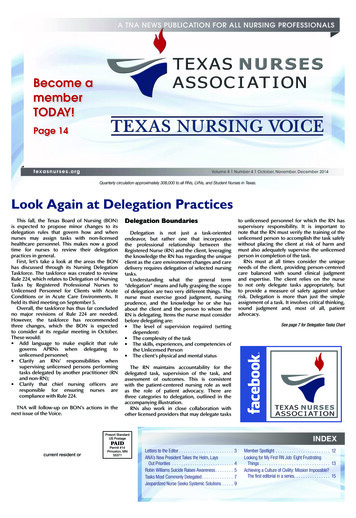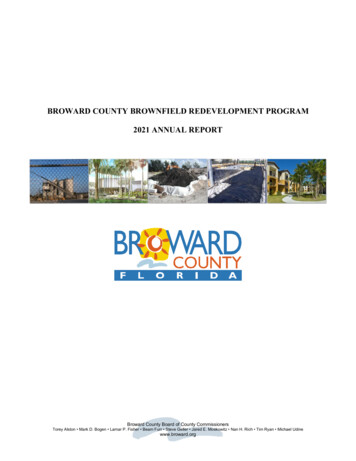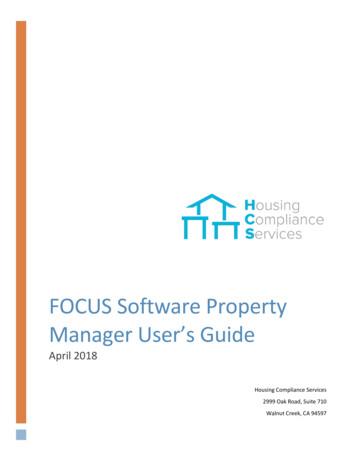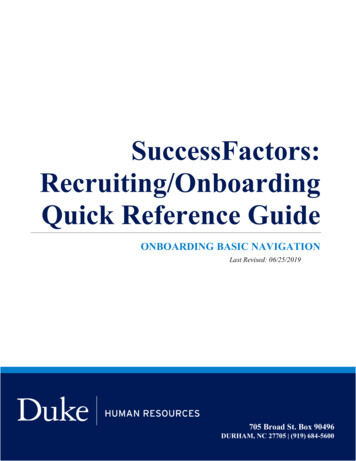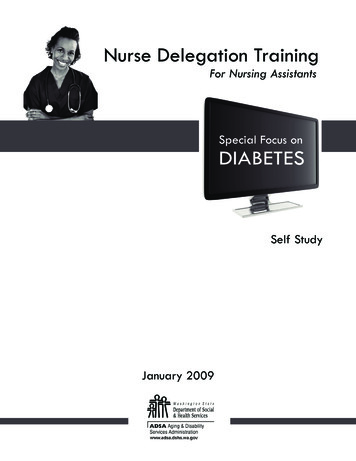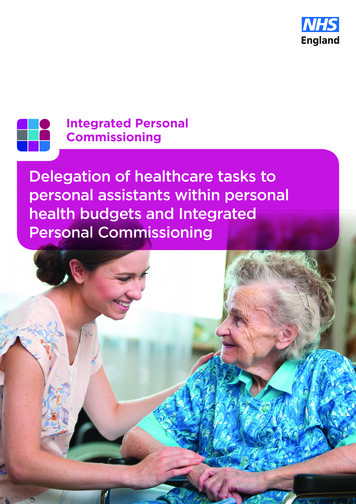
Transcription
Integrated PersonalCommissioningDelegation of healthcare tasks topersonal assistants within personalhealth budgets and IntegratedPersonal Commissioning
Delegation of healthcare tasks to personal assistants within personal healthbudgets and Integrated Personal Commissioning2NHS England Information Reader BoxDirectorateMedicalOperations and informationSpecialised commissioningNursingTrans. and Corp. Ops.Commissioning strategyFinancePublications Gateway Reference:06636Document purposeGuidanceDocument nameDelegation of healthcare tasks to personal assistantswithin personal health budgets and Integrated PersonalCommissioningAuthorNHS England/Personalisation and ChoicePublication dateJune 2017Target audienceCCG Clinical Leaders, CCG Accountable Officers, CSUManaging Directors, Care Trust CEs, Foundation Trust CEs,NHS Trust CEsAdditionalcirculation listDirectors of Nursing, Local Authority CEs, Directors ofAdult SSs, Allied Health Professionals, Directors ofChildren’s ServicesDescriptionThe personal assistant delegation guide provides aframework for the delegation of healthcare tasks to personalassistants supporting adults, children and young peopleCross referenceN/ASuperseded docs(if applicable)N/AAction requiredN/ATiming/deadlines(if applicable)N/AContact details forfurther informationPersonalisation and ChoiceSkipton House80 London RoadLondonSE1 6LHDocument StatusThis is a controlled document. Whilst this document may be printed, the electronicversion posted on the intranet is the controlled copy. Any printed copies of thisdocument are not controlled. As a controlled document, this document should not besaved onto local or network drives but should always be accessed from the intranet.
Delegation of healthcare tasks to personal assistants within personal healthbudgets and Integrated Personal Commissioning3Contents1Introduction42The case for delegating healthcare tasks to personal assistants53Ensuring appropriate governance and assurance arrangements74Developing a robust process for delegation84.18Identify the tasks to be delegated4.2 Identify how training and assessment of competencewill be provided5694.3 Sign-off and review10Roles, responsibility and accountability135.113The commissioner5.2 The care coordinator145.3 The registered practitioner155.4 The personal health budget holder, nomineeor representative acting as employer165.5 The personal assistant17Key learning and advice18References19
Delegation of healthcare tasks to personal assistants within personal healthbudgets and Integrated Personal Commissioning41 IntroductionThe NHS Five Year Forward View1 set out a clear direction for the NHS includinga commitment to a ‘new relationship with patients and communities’. Givingpeople more control, including through personal health budgets and IntegratedPersonal Commissioning (IPC), is a core part of achieving this and increasingthe direct control people have over the care that they receive.For many people, employing a personal assistant (PA) or a team of PAs is acentral part of creating care and support arrangements that are personalisedand responsive to their individual needs and circumstances as an adult or childand as a family. PAs, chosen by the individual and where appropriate their carers,or in the case of children their parents, can help support people living in thecommunity to achieve their personal goals and to have the opportunity to leadtheir lives and have a family life on their own terms.A PA’s role will vary according to the needs, lifestyle requirements and choices ofeach person they support. When a PA is providing care and support to someonewith healthcare needs, an important component of their role can include carryingout tasks that are of a clinical nature. These tasks must be considered in the careplanning process and delegated to the PA by a registered practitioner who hasthe relevant occupational competence. They must only be delegated when it isin the best interests of the person concerned.This framework identifies the elements required to support appropriate delegationof a healthcare task from a registered practitioner to a PA, and the responsibilitiesof all concerned. It aims to help registered practitioners understand the decisionmaking process involved in delegation, and to help clinical commissioning groups(CCGs) to establish clear protocols for ensuring safe and appropriate delegationto PAs, so that responsibilities and lines of accountability are understood by all.It is not intended to specifically cover issues relating to agency carers and othersupport workers, although many of the principles may be relevant to them too.It is informed by work carried out in NHS organisations over a period of two yearsfrom 2014 to 2016, supported by Skills for Health.It is important to note that registered practitioners are professionals who areregulated by statute and so are specifically accountable to their regulatory bodyas well as to their employer. This guidance does not circumvent any standardsfor delegation set by their regulatory body, which they are required to meet(e.g. the Nursing and Midwifery Council (NMC) for nurses, midwives and healthvisitors, and the Health and Care Professions Council (HCPC) for physiotherapists,occupational therapists, dieticians, speech and language therapists).
Delegation of healthcare tasks to personal assistants within personal healthbudgets and Integrated Personal Commissioning52 The case for delegating healthcare tasks topersonal assistantsThe ability for individuals to employ their own PA or carer is one of the biggestopportunities presented by personal health budgets. It means that peopleare able to choose who they want to provide their care and support and theycan more flexibly control how it is delivered to suit the needs and lifestyle ofthemselves and their family. As a growing workforce in healthcare, PAs makean important contribution to supporting the health and wellbeing of people inthe community. Where the people they support have requirements for clinicalinterventions, delegating some carefully considered tasks to PAs can havebenefits for all involved. There will also be tasks that are considered unsuitablefor delegation because of the complexity of the task, the degree of judgementrequired or individual circumstances. PAs can play an important role supportingthe work of the wider multidisciplinary team, but do not substitute the need forskilled, registered practitioners working in the community.Delegation should be recognised as something that is a considered process andproperly supported. This will help ensure that the best interests of the personare always paramount, that tasks taken on by PAs are appropriate, and that PAsare provided with relevant training and assessed as competent to perform theparticular task.Where a task can be appropriately delegated to a PA, a number of benefitshave been identified, including: The person’s needs can be responded to in a timely manner, when and wherethey require, enabling them to get on with their life while knowing that theyand their PA have access to support and clinical advice from a registeredpractitioner when required.“ I’ve found having a personal health budget has had a major impact on mylife, it’s given me a lot more choice and independence in what carers I choose,what they are trained in and how they assist me. Without this it would be alot more difficult to live out of my family home and live independently withmy partner. Also to set up my own business and move ahead with my life.”Matt, personal health budget holder. The PA may have developed a very good understanding of the person’sindividual preferences and needs and have particular skills in communicatingwith them. This relationship, alongside their availability, can mean a PA is ideallyplaced to take on some healthcare tasks when appropriately delegated to them.“ Just recently when Manish had a hospital admission his PAs were ableto support him in hospital. They stayed overnight with him, which wasa huge support because he felt confident in their ability to care for him.”Jacqui Giddings, Community Children’s Nurse, South WarwickshireNHS Foundation Trust.
Delegation of healthcare tasks to personal assistants within personal healthbudgets and Integrated Personal Commissioning6 Appropriate delegation can make best use of NHS workforce resources andskills, increasing efficiency and providing longer term savings in staff time andcosts. It can increase staff satisfaction through enabling effective use of skills.“ The beauty of delegated healthcare tasks being taught to PAs is that Matt’sgot so much more flexibility in his care arrangements and he can come andgo as he pleases throughout the day. We can also much more efficiently usethe healthcare professionals that we have got, the budgetary implicationsof having a qualified nurse here 24 hours a day would be impossible.”Julia, nurse who provides tracheostomy training to Matt’s PAs. Appropriate delegation to PAs can enable people to stay living at home,support more speedy and effective hospital discharge and prevent or reducehospital admission.“Ultimately that’s what it’s all about – keeping people safe in their own homesand ensuring good practice to increase the quality of life and reduce hospitaladmissions.” Angela Milbourne, Clinical Matron, James CookHospital, Middlesbrough. For the PA, developing new skills and being able to more fully meet theperson’s needs can help make the role more rewarding and help PAs feelvalued, motivated and recognised in their work. Associated training andassessment of competence can help provide evidence of their skills andknowledge and support recruitment, retention and career progression.“ We’ve had lots of enthusiasm for training from PAs. This is a group ofhealthcare workers that can really benefit from high-quality trainingand formal recognition of the importance of their skills. It’s wonderfulto see the PAs growing in confidence as they progress through training.”Sarah Cripps, training provider.Developing a shared understanding of the case for the delegation of somehealthcare tasks to PAs will contribute to creating an organisational culturethat supports staff to delegate appropriately. It will help establish the basis forinvestment in a robust programme of training and assessment of competenceto underpin the delegation of healthcare tasks.
Delegation of healthcare tasks to personal assistants within personal healthbudgets and Integrated Personal Commissioning73 Ensuring appropriate governance andassurance arrangementsDelegation occurs throughout the NHS on a daily basis, but as PAs are new tothe NHS there is often less understanding of how and when to delegate to them.PAs are employed either directly by the person requiring the care and supportor indirectly by a third party organisation on their behalf, and therefore lines ofaccountability can appear less clear to NHS practitioners.It is therefore important that CCGs, as the responsible bodies for planning andcommissioning healthcare services in their local area, put in place a clinicalgovernance framework for delegation to PAs. This means that there should bea clearly identified local process for making decisions about what can and cannotbe delegated to a PA. The process should include how training and assessmentof competence will be provided, how any ongoing support and review ofcompetence will be provided, and how ongoing clinical review of the person’sneeds is maintained and by whom. PAs may not assess an individual who theysupport, or make clinical decisions based on their own assessment; thereforegovernance needs to include arrangements for ongoing oversight and contactarrangements for advice and reassessment. This is particularly important wherea child’s or an adult’s needs are known to be changing or fluctuating, but it mustbe in place in all circumstances.In addition, there may also be implications for the confidentiality and privacy ofpersonal data for both the person and their PAs as part of setting up new ways ofworking. As such it will be important for CCGs to carefully review risks in this areaprior to establishing any new approaches (see the IPC and personal health budgetfinance and commissioning handbook for more guidance in relation to this).2Aligning governance arrangements with how services are commissioned locally,and with arrangements for delegation to other care workers in the community,can help ensure consistency and also contribute to ensuring that associatedtraining programmes are sustainable and provide value for money.The need for a robust governance framework to underpin delegation is madeclear in the Royal College of Nursing’s principles of delegation:3“ Any delegation of healthcare tasks to unregistered health and non-healthqualified staff must be undertaken within a robust governance framework,which encompasses: Initial training and preparation. Assessment and confirmation of competence. Confirmation of arrangements for ongoing support, updating of trainingand reassessment of competence.”
Delegation of healthcare tasks to personal assistants within personal healthbudgets and Integrated Personal Commissioning8Personal health budgets do not release the NHS from their duty of care topeople within their care. Where people employ their own PAs, through the use ofa personal health budget, CCGs are responsible for ensuring that care plans meetthe identified health and wellbeing needs of the person and are an appropriateuse of resources. The CCG must agree that the health needs of the person canbe met through the purchase of the services specified in the care plan, that thecare package contains everything necessary to deliver safe care, and that anysignificant risks have been discussed with the person or their representative, withappropriate procedures included to manage these risks. Personal health budgetsincrease the level of choice and control that people have but they do not changethe statutory duty of care that the NHS has to all individuals.A local governance framework for delegating healthcare tasks to PAs mightusefully include: principles of delegation and clarification of roles, responsibilitiesand accountability the process to be followed in considering delegating tasks to PAs andhow decisions should be made an indicative list of healthcare tasks that might commonly be considered fordelegation to PAs (it must be made clear that this is indicative only and thateach decision must be made in relation to individual needs and circumstances) identification of the model of training and monitoring of PAs who carry outdelegated health tasks any generic training that will be provided to PAs in core competencies identification of the related training required for each healthcare task andhow competency will be assessed and signed off how ongoing support and advice will be provided to PAs the process for review and reassessment of competence.4 Developing a robust process for delegation4.1 Identify the tasks to be delegatedDelegation of specific healthcare tasks should be considered within the careplanning process. Care planning is central to the delivery of personal healthbudgets. It is at this stage of the process, after gathering information andunderstanding the person’s health and wellbeing needs, that detailed plansare made. Care planning uses a partnership approach between the healthcarepractitioner and the person, along with their family and carers as appropriate.It looks at what is working and what is not working, what is important to theperson and what outcomes they wish to achieve. Subsequent to this an actionplan is drawn up and agreed. If the plan includes employment of a PA, this is thetime to consider what tasks the PA will carry out, the competencies required andany training needed. Some tasks may be considered unsuitable for delegation toa PA, and consideration can be given to the best way to deliver these, which maybe through existing NHS services or separately purchased care or support.
Delegation of healthcare tasks to personal assistants within personal healthbudgets and Integrated Personal Commissioning9The care plan should make clear the task that is to be delegated, the limitsof the delegation and how risks will be managed. It will also need to identifycontingency arrangements should there be a gap in service, for example whenthe PA is on leave or off sick.The budget must be sufficient to meet all the costs for delivering the care plan,including any training costs necessary for delivery. In some cases there will bemore than one PA requiring training and all costs should be met within the budget.It can be helpful to have a locally agreed indicative list of tasks that arecommonly delegated to PAs. This can include the level of training requiredand how competence is assessed for each task. This list should not be usedindiscriminately or used as a barrier to making decisions in relation to othertasks not listed. In every situation the individual context must be taken intoaccount before making a decision to delegate and any list is only a guideline.The decision-making flowchart on pages 12 and 13 can be helpful in thinkingthrough the process.4.2 Identify how training and assessment of competence will be providedFor tasks that can be delegated, the action plan needs to identify how theassociated training will be provided and who will be responsible for assessmentof competence, ongoing support to the PA, and clinical review of the person’sneeds. The approach to provision of appropriate training and assessment ofcompetence of PAs in healthcare tasks is likely to vary from one locality toanother and will need to be proportionate to the specific task. The followingare the key components to be considered in order to establish an appropriatelocal system for training and assessment of competence: Identification of the healthcare task/s most likely to be delegated. Identifying and agreeing the knowledge and skills required to achievecompetence in each task. Development of training materials for each task. Identification of how and by whom the knowledge training will be deliveredand assessed and the standard it will be assessed against. Identifying how and by whom the skills training will be delivered, competenceassessed and the standard it will be assessed against. Identifying how achievement of competence will be recorded. Identifying how and when any refresher training and reassessmentof competence will be provided. Identifying ongoing support requirements. Identifying a process to follow when a PA does not achieve therequired competence. Establishing how PAs will be able to be released for training and anybackfill costs met. Identifying any associated risks related to delivery of the task, and providingrelevant training for the PA to know how to deliver the task safely, avoidinginjury to the person and to themselves.
Delegation of healthcare tasks to personal assistants within personal healthbudgets and Integrated Personal Commissioning10While the knowledge component of learning a task can be provided throughuse of web-based learning tools or group approaches, the individual skillsrequired will need to be taught and competence assessed in the person’s home.The nature of the work of PAs presents some particular challenges to provisionof training, which need to be thought through. These include the following:1.It can be difficult for PAs to be released from their work to attend training.Unless all training is in the home, backfill care often needs to be providedand any additional costs need to be met through the care package.2. PAs are often working across a large geographical area. This, combined withthe numbers requiring training in any one specific task at one time, makes itdifficult to get a group of people together for classroom-style training forthe knowledge component.3. Assessment of competence requires assessors to be flexible in the time theyare available, so that this fits with times that the task is required to be carriedout and the working hours of the PA.4. Delegation, training and assessment of competence need to be managedin a timely way as delays can impact on care provision.5. The role of a PA and the nature of healthcare tasks is very individual andperson-centred. While some of the training can be generic, there needs tobe a specific, individual, person-centred aspect incorporated in the trainingand assessment of competence.4.3 Sign-off and reviewThe final decision to delegate a healthcare task to a PA should be made bya registered practitioner who is occupationally competent in the task and isaccountable in relation to that aspect of clinical care of the client, and willfollow on from training and assessment of competence. Delegation must firstand foremost be in the best interest of the person for whom the care and supportis being provided and it is important that they, or their representative, have beenconsulted and are in agreement with the arrangements. It is also important thatthe PA feels both competent and confident to carry out the task and that thetask/function/health intervention is within the remit of their job description.A three-way process, where all parties record that they are happy for the taskto be delegated, can be a useful way forward. This same written agreement canincorporate information about the extent and limits of the delegation, how supportwill be provided and competency maintained, and when and how to seek help.Frequency of review should be documented in the care plan and should takeinto account the person’s clinical needs and changing requirements in relationto healthcare tasks. Review should also include a review of the tasks currentlydelegated to a PA and a review of training and competency. If a person’scondition is unstable or fluctuating, or there is a significant deterioration intheir physical condition, cognition or personal circumstances, the nature ofthe tasks may change and this will require review of the decision to delegatehealthcare tasks. At review, if refresher training for the delegated task or trainingin new tasks to be delegated is required, then the budget allocation may needadjusting to allow for this.
Delegation of healthcare tasks to personal assistants within personal healthbudgets and Integrated Personal CommissioningThe following flowchart illustrates the decision-making process for delegationof healthcare tasks to PAs:Delegation of a task to a personal assistantMatrix 1: Assessment of the taskSTARTWhat is the task?Can this task onlybe performedby a registeredpractitioner?YESNONOIs delegation in thebest interest of theperson?YESProceed to decisionMatrix TwoYESHave you gainedthe person’sconsent?NODo not delegate11
Delegation of healthcare tasks to personal assistants within personal healthbudgets and Integrated Personal Commissioning12Matrix 2: Assessment of the personal assistantSTARTIdentify a PA to whomthe task is to bedelegated.Box 1: FeasibilityFeasibility includes considerationof time constraints, resources,capabilities and cost.Do not delegateYESNOIs the task withinthe PA’s role?Should the role bere-viewed so that thetask is included?NOYESYESBox 2: Knowledge, skillsand trainingDetermine whether the PA hassufficient knowledge, skills andtraining bearing in mind thefollowing: Has the PA been trained to carryout the task? When was the training last given? Has the task changed sincetraining and has training beenupdated?Does the PA havesufficient knowledge,skills and training tocomplete the task?(see box 2)NOIs it feasible (see box 1)for the PA to gain thesufficient knowledge,skills and training forthe task?YESAgree how training willbe provided and fundedto ensure that the PA hassufficient knowledge,skills and training forthe task.YESBox 3: Competenceand confidenceWhen considering if the PA iscompetent and confident to carryout the task, note the following: Does the personal health budgetholder/employer view the PA asa suitable person to carry out thetask? Do you believe the PA to becompetent and confident to carryout the task? Does the PA consider themselvesto be confident and competent tocarry out the task? Does the PA recognise thelimits of their competence andauthority, and know when andwhere to seek help?Is the PA competent andconfident to carry outthe task? (see box 3)NOIs it feasible(see box 1) for the PA tobecome competent andconfident to carry outthe task?YESAgree how training willbe provided and fundedto ensure that the PAbecomes competentand confident tocarry out the task.YESHas the PA beenNOprovided with writtenprocedures for properperformance of the task?Take appropriate actionto provide the PA withwritten procedures.YESDoes the PA knowwho to contact forinformation advice andguidance (IAG)?NOEnsure that anappropriate contact isidentified and availableto provide IAG.YESYESReviewDelegateNOHas it been identifiedhow and whencompetence will bereviewed and ongoingsupport provided?NOMake sure it isidentified how and whencompetence willbe reviewed andsupport provided.NO
Delegation of healthcare tasks to personal assistants within personal healthbudgets and Integrated Personal Commissioning135 Roles, responsibility and accountabilityAccountability for delegation is a consideration for all those involved, includingsenior managers and commissioners. As identified earlier, practitioners are oftenconcerned about their accountability should something go wrong and thereforecan be reluctant to make decisions about delegation, provide training or sign offcompetence. A sound governance framework for delegation will help ensure thatroles and responsibilities are understood and that systems are in place to supportdelegation. Understanding the responsibility to delegate appropriately and therisks both in not delegating or not delegating appropriately, along with soundprotocols, will help ensure safe and effective practice.A registered practitioner who delegates a task remains accountable for theappropriateness of the delegation and ensuring that the person who does thework is able to do it. They cannot delegate that accountability. However, providedthe decision to delegate is made appropriately they are not accountable for thedecisions and actions of the PA to whom they delegate. The PA is accountable foraccepting the delegated task and responsible for their actions in carrying it out.5.1 The commissionerCommissioners, whether based in the CCG or a commissioning support unit(CSU), have the overall responsibility to ensure that the system commissionedfor delegation, training, competency assessment and review is safe and robust.In terms of delegation of healthcare tasks via a personal health budget theseresponsibilities include:1.Commissioning the appropriate staff for care coordination and delegationwithin a comprehensive service specification which details the roles andresponsibilities of the commissioned provider.2. Commissioning an appropriate system for training and assessment ofcompetence in delegated healthcare tasks, including ongoing support andsupervision of PAs in carrying out the delegated task.3. Maintaining effective contract management oversight of providers andcomplaints to ensure the service specification of the care plan coordinatorrole, the accountable healthcare practitioner, and associated training functionscontinue to be met throughout the contract.4. Being clear about who the accountable healthcare practitioner is for reviewingthe person’s clinical needs.
Delegation of healthcare tasks to personal assistants within personal healthbudgets and Integrated Personal Commissioning145.2 The care coordinatorEveryone with a personal health budget should have a named care coordinator.The care coordinator is normally someone who has regular contact with theperson receiving care, and their representative or nominee if they have one.The care coordinator is responsible for managing the assessment of the healthneeds of the person as part of the care plan, ensuring that the person (orrepresentative) and the CCG have agreed the care plan, undertaking or arrangingfor the monitoring and review of the care plan (and direct payment whereapplicable) and the health of the person, and liaising between the CCG and theperson with the personal health budget. While they may arrange with others toundertake actions, the care coordinator should be the primary point of contactbetween the person and the CCG and ensure that everything necessary forsatisfactory delivery of the care plan is in place.In relation to delegated healthcare tasks, the care coordinator is responsiblefor ensuring that:1.A registered practitioner with relevant occupational competence in relationto the specific area of clinical care for the person (in some instances this maybe the care coordinator) makes a more detailed assessment of suitability todelegate the identified task and it is the registered practitioner who makesthe decision to delegate or not.2. Arrangements for training and assessment of competence necessary todelegate are clearly specified in the care plan.3. The person requiring the care or their representative has been consulted as towhether they are happy in principle with the task being delegated to their PA.Where the person lacks capacity to make decisions as to how their care needsshall be met, a formal best interests decision should be made as to whether inthis case it is appropriate for the healthcare task/s to be delegated.4. Funding is included in the plan to cover any cost of training and assessment ofcompetence necessary to delegate, ongoing support and related insurance.45. Roles and responsibilities are clearly identified and understood.6. Support is available locally for personal health budget holders acting asindividual employers to support them in their employer responsibilities,including in writing job descriptions and person specifications,
Directors of Nursing, Local Authority CEs, Directors of Adult SSs, Allied Health Professionals, Directors of Children's Services Description The personal assistant delegation guide provides a framework for the delegation of healthcare tasks to personal assistants supporting adults, children and young people Cross reference N/A Superseded docs

